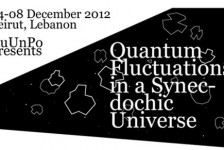“In a mapped configuration of time-space, OuUnPo lands at a temporary shift in the magnitudes of entropy and gravity. It is one in a multitude and finds itself when the unknown starts.It is a twofold encounter, one contemporary with its participants, the other with an inhabitant of age, which you would call a distant future. What happens is only possible to seize in its aftermath.
Recurrence of places is a possibility yet there will be no repetition. Guided by the uncertainty principle the encounters will unfold as moderate conditions are at hand.
The synecdoche is your key to access a tropic space. The figure of speech involves an intermitted yet visionary perception. You speak as you articulate silence, as you subvert absence and presence. One part may stand in for the whole under circumstance as well as the whole can fit into the most modest detail. You presume what is real from that which that glances at you. The fictional is a reality and a posterior is already in there. It is a journey of wonders, where one cannot expect to trust all that is visible. You are on your own to collect resonances as you go along, to reconstruct a meaningful universe from a discontinuous landscape of fragments. Coincidences,
recurrences, déjà vus. These are your way to a simultaneous understanding in the moment of life where time comes into place. You call it now, they call it history, we call it future.”
Sara Giannini & Fatos Üstek.
OuUnPo in Lebanon, 4-9 December 2012
OuUnPo is a European research network made up of artists, curators and researchers who travel to different cities to investigate a given problem. They work in intimate dialogue with local creators, museums, art organizations, research centers, residency programs and informal groups. The session in Beirut, “Quantum Fluctuations in a Synecdochic Universe” marks the beginning of a two year itinerant research project in collaboration with Global Art and the Museum entitled “Catastrophe and Heritage.” It sets out to investigate how a crises offers potential for creation and development of new ideas and also how catastrophe marks cultural heritage. The diverse and multiple reactions, interactions and reflections on these problems will be witnessed, experienced, supposed, analyzed, contemplated, performed, discussed, contested, negated and emphasized in Japan (Spring 2013), Sweden (Autumn 2013) and Brazil (Spring 2014).
Lying on the shore of the Mediterranean, Beirut is a city whose past and recent history is intertwined with international geopolitical events. The city offers a complex and multi-layered urban tissue that acts as a fascinating starting point for an investigation of collective memory. Strains of today’s life in Lebanon are marked by the wounds caused by wars and also by the events of the Arab Spring. Its geographical and cultural proximity to Syria pushes OuUnPo to directly question the position of the artist, or more in general the cultural agent, within a specific political and historical context. As a transnational, non-hierarchical European network of artists, curators, scientists and scholars OuUnPo will deal with many uncomfortable questions and investigate how interactions between Europe and the Middle-East can foster the co-creation of important knowledge in the two regions.
Sara Giannini and Fatos Üstek organize the session with fellow OuUnPonians, Yane Calovski, Klas Eriksson, Raffaella Della Olga, Per Hüttner, Jacopo Miliani, Marco Pasi, Natasha Rosling, Claudia Squitieri, Samon Takahashi, Stephen Whitmarsh, Amanda Abu Khalil, Mounira Al Solh Mirene Arsanios, Marwa Arsanios, Seth Ayyaz, Monika Borgmann, Chaza Charafeddine, Lawrence Abu Hamdan, Sandra Iché, Ilaria Lupo, Ghassan Maasri, Jean-Marc Nahas, Nora Razian, Karine Wehbe, Raed Yassin and many more.
To find the program and updates, please click here.
The project is supported by Linköpings universitet and the European Cultural Foundation.


